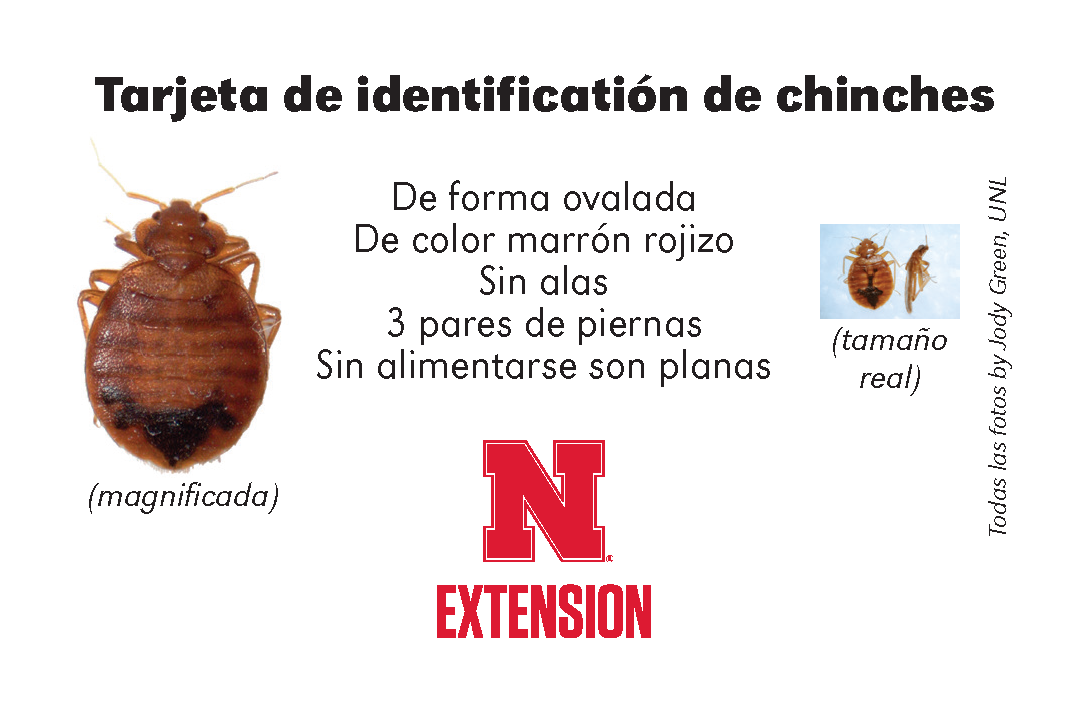
Nasrin Nawa |
February 19, 2024
Did you know there is a quick and convenient resource to help you identify bed bugs, and it even fits in your wallet? A valuable tool packed with information, Nebraska Extension offers Bed bug ID cards for on-the-go identification and assistance. Intended to help aid in the search for and recognition of bed bugs, these cards not only provide a reference for what to look for, but also serve as a useful tool to fit into cracks and crevices, making them perfect for checking the insect’s potential hiding spots.
Extension Bed bug ID cards and resources are also currently available in English and Spanish with around 20,000 cards and an additional 10,000 bed bug brochures distributed across Nebraska to date.
Created by Extension Educator and Urban Entomologist Jody Green, the Bed bug ID cards underscore the “importance of awareness and identification of bed bugs.” Because bed bugs can infest homes, bite, and are often difficult to manage, stopping bed bug “hitchhikers” is a crucial first step in prevention. “Know how to identify and find bed bugs before they find you” says Green. The cards show real-life, actual-size images of bed bugs and other signs that bed bugs leave behind, like cast skins, fecal stains, and eggs.
Acknowledging the lack of public awareness and scientific information, Green also notes the negative consequences of bed bug infestations, including the spread of misinformation, unnecessary school closures, and negative financial impacts to individuals and families who need to manage them. She emphasizes the “importance of science-based information and practical strategies to positively influence polices and behavior – all to keep bed bugs at bay.”
Bed bug ID cards are simply one tool in the toolbox of Nebraska Extension’s bed bug education program. Since 2016, University of Nebraska-Lincoln urban entomologists have reached more than 8,500 learners through presentation, webinars, workshops, and interactive exhibits, contributing to more informed and empowered communities.
Green recently collaborated with the Furniture Project in Omaha to enhance their work system and reduce the risk of bugs. Drew Gerken, the founder of Furniture Project, expressed his satisfaction, stating, “The service of Extension was fantastic. We were just overwhelmed by how comprehensive the system was, for an organization to receive our request and come in with a curated presentation.”
The Furniture Project collects furniture and household items and collaborates with 165 local organizations to distribute them to those in need. “We feel that it is so important that we never want to introduce invasive insects to the people we are serving. For that reason, we reached out to Nebraska Extension for educational services to ensure our system is effective in mitigating the risk and improving.”
Kait Chapman, Extension Educator and Urban Entomologist, highlights the need for adaptive bed bug programs to fit the demands of different audiences. “Because bed bugs don’t discriminate, working with different communities of learners is essential, from homeowners, renters, and travelers, to businesses, community organizations, pesticide applicators and more.” Information on bed bug “action plans” was even incorporated into the “Nebraska Infection Control for Education” book produced by Children’s Nebraska, as a valuable resource for schools.
Extension Educator Elizabeth Exstrom emphasizes that bed bugs are not limited to urban areas, recounting a call from a client in a rural setting. “Proper identification,” facilitated by the bed bug ID card, “is crucial in providing correct management steps to individuals regardless of their location,” she said.
“We worked with Extension, and I do hope going forward, it is comforting to know this resource is available, not only for us as an organization but for the thousands of families that we serve. We served more than 4,000 people last year. By helping us, you [Extension] helped thousands of more people to have safe, bug-free houses,” added Gerken.
“You can’t help what bugs are out there, but the information on this card may prevent you from bringing bed bugs home with you,” says Green. Awareness and early detection is the key to successful treatment.
For those interested in purchasing the card visit https://marketplace.unl.edu/default/bed-bug-id-cards.html
Bed bug ID cards are available in English and Spanish and can be purchased in bulk for organizations to provide for employees. Such organizations include community services, hotels/motels, consignment/thrift stores, healthcare facilities, in-home services, and companies that perform installation, cleaning or repair.
For more information on bed bugs from Nebraska Extension, visit the website: https://lancaster.unl.edu/bedbugs.